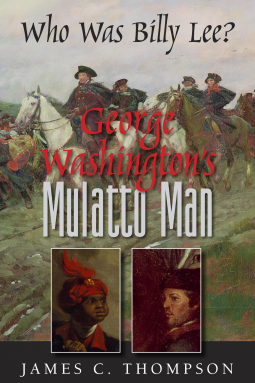
George Washington's Mulatto Man
Who Was Billy Lee ?
by James C Thompson
This title was previously available on NetGalley and is now archived.
Buy on Amazon
Buy on BN.com
Buy on Bookshop.org
*This page contains affiliate links, so we may earn a small commission when you make a purchase through links on our site at no additional cost to you.
Send NetGalley books directly to your Kindle or Kindle app
1
To read on a Kindle or Kindle app, please add kindle@netgalley.com as an approved email address to receive files in your Amazon account. Click here for step-by-step instructions.
2
Also find your Kindle email address within your Amazon account, and enter it here.
Pub Date Feb 18 2016 | Archive Date Jun 23 2016
Description
In George Washington's Mulatto Man – Who was Billy Lee, author James Thompson connects dots that remain from a series of events, which began more than twenty-five years before Americans declared their political independence and ended more than twenty-five years after they achieved it. The great majority of these events are known through comments in George Washington’s papers. The most important is a paragraph in Washington’ will, which he revised a few months before his death. In this paragraph, Washington freed his "mulatto man William" and bestowed upon him a lifetime annuity. This unusual act of generosity appears even more peculiar when it is known that Washington had shunned his servant through the last nine years of his life. Nor did he give him an audience as he lay dying. Washington had acquired his “mulatto” man from his cousin in 1767. What was the mysterious bond that tied them together for thirty-two years and induced Washington to provide for Billy when he was gone?
Thompson contends that only one thing could have bound the greatest man in history to his anonymous slave. This, he says, was a vow that Washington made to his half-brother Lawrence prior to Lawrence’s death in July of 1752. In Thompson’s scenario, Lawrence had pledged to care for the children of his brother-in-law, George William Fairfax. Fairfax’s father was Lawrence’s benefactor, and his son was Lawrence’s best friend. On the eve of his premature death, Thompson theorizes that Lawrence explained his secret to his idolizing younger half-brother and that he commanded George to fulfill his commitment when he (Lawrence) was gone. In his narrative, which he describes as a “constructive interpretation,” Thompson effectively defends this implausible thesis.
Thompson contends that only one thing could have bound the greatest man in history to his anonymous slave. This, he says, was a vow that Washington made to his half-brother Lawrence prior to Lawrence’s death in July of 1752. In Thompson’s scenario, Lawrence had pledged to care for the children of his brother-in-law, George William Fairfax. Fairfax’s father was Lawrence’s benefactor, and his son was Lawrence’s best friend. On the eve of his premature death, Thompson theorizes that Lawrence explained his secret to his idolizing younger half-brother and that he commanded George to fulfill his commitment when he (Lawrence) was gone. In his narrative, which he describes as a “constructive interpretation,” Thompson effectively defends this implausible thesis.
A Note From the Publisher
Thompson's ingenious sleuthing shows how conspicuous facts become invisible when viewed through wrong lens. In his concluding comment, he explains why the qualities of his person coupled with his circumstances allowed George Washington to become the greatest man in history. Thompson credits the great man for honoring his vow to his half-brother, but he also blames him for “ruining” his faithful servant. He criticizes the slanted analysis of historian Fritz Hirschfeld and defends Washington against the insinuation that the greatest man in history was a 20th century racist. He bases this argument on the claim, which his text supports, that 18th century society is not equivalent to 20th century society and that 20th century racism, which Mr. Hirschfeld chose not to define, was not a characteristic of 18th century men like George Washington.
Available Editions
| EDITION | Other Format |
| ISBN | 9780990959243 |
| PRICE | $26.00 (USD) |



